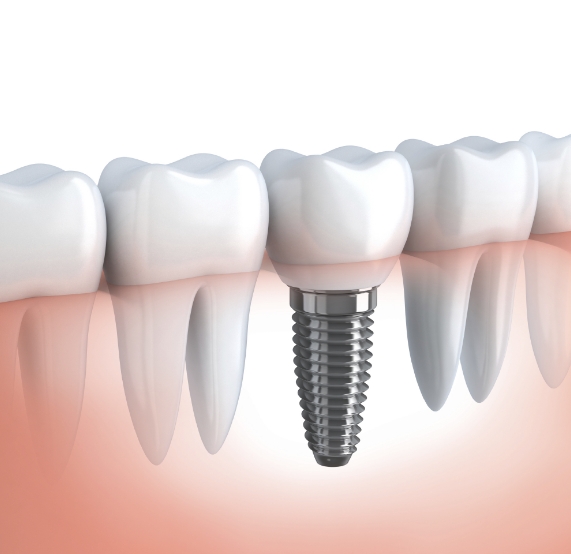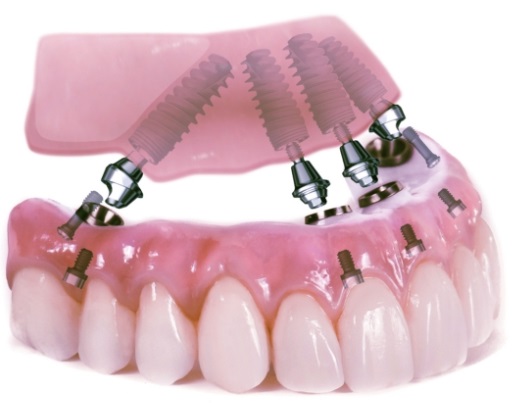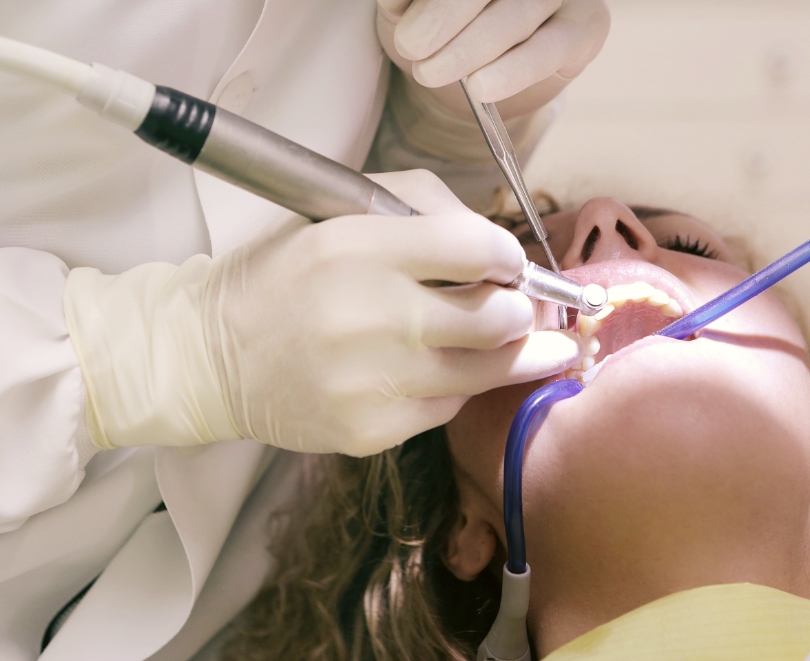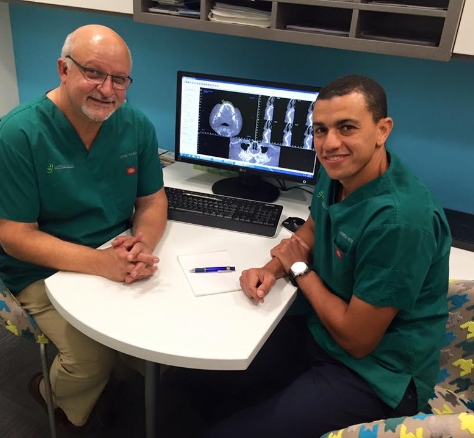Full Mouth Dental Implants
If you have several missing or damaged teeth, there is a fair chance it is having a significant impact on your health, appearance and self-esteem. If your teeth don’t function properly, it can impact how you eat, smile and talk. Fortunately, full mouth dental implants can be used to replace a full arch or set of missing teeth. And, today, there are more options than ever. While whole mouth dental implants were often unsuitable for many patients, new techniques have made them far more versatile. Now that is really something to smile about.
What Are Full Mouth Implants?
When you think about replacement teeth, you might automatically assume that dentures are the answer. However, while dentures can solve the problem to some extent, they bring their own issues, often being uncomfortable or embarrassing. Full mouth implants do exactly what the name suggests, offering an alternative solution to dentures.
Full mouth dental implants work in the same way as single implants. A titanium screw is placed in the jawbone and a crown attached to replace the missing tooth. However, for full mouth implants, an implant isn’t required for every missing tooth. Instead, groups of missing teeth can be replaced by bridgework supported by the implants.
Full mouth implants, a commonly used treatment option, provide many advantages over the alternatives:
Comfort
Implants are permanently attached to your jawbone, which means that they both look and feel like natural teeth. That means that you are able to eat and talk as normal without any worry of them aggravating your mouth.
Stability
As implants are placed directly into your jawbone, they move with your mouth as you eat, talk and smile. Dentures, on the other hand, can come loose and are far less stable.
Support
All teeth implants are the only way to replace your teeth while protecting your bone and dental health. As your jawbone fuses with the implants, they work to preserve the health of the bone and support your facial features.
Maintenance
While you don’t have to worry about taking implants out to clean them, you do need to maintain good oral hygiene. However, as with your normal teeth, if you brush and floss regularly and visit your dentist frequently, they can last you a lifetime.
The Different Types Of Full Mouth Implants
Dental implants offer a secure anchor for replacement teeth providing long-term benefits in comparison to removable dentures. As dental implants have become more commonplace, alternative, and innovative treatments have been developed. There are two primary types of dental implants:
1. Traditional Dental Implants
The treatment requires a minimum of two oral surgeries. Firstly, small titanium screws are placed into the jawbone. However, as each implant can only support a few replacement teeth, for all teeth implants, at least eight implants are required per arch. Then, three to six months later, once the jawbone has had a chance to heal, the abutment is added to the implant. This is the piece that allows the final dental restoration to be attached, the visible part of the replacement teeth. Traditional full mouth implants are only suitable for patients who have substantial bone density to support them.


2. All On 4 Implants
All on 4 implants are similar to traditional dental implants in that they work by placing titanium screws into the jawbone to support replacement teeth. However, as the name suggests, the procedure enables a full arch of upper or lower teeth to be supported on just four implants. This is possible due to the positioning of the implants, cleverly angled at 45 degrees, which avoids areas of reduced bone density whilst retaining strength. As only four implants are required, the surgery is far less invasive, healing time is a lot faster, and the procedure is suitable for more complex cases.
The Benefits Of All On 4 Dental Implants
Both traditional implants and All on 4 implants can provide natural-looking, perfectly-functioning replacement teeth that preserve jaw bone structure and maintain facial aesthetics. However, while conventional implants are a great treatment option for patients who are missing a couple of teeth, when it comes to full mouth dental implants, All on 4 offers several advantages:
Simple
As All on 4 implants avoid areas of reduced bone density, they often prevent the need for additional procedures such as bone grafting. This makes All on 4 less invasive, faster and altogether simpler for the patient.
Fast
All on 4 implants are strategically placed to deliver high together values making them stronger and able to support replacement teeth immediately. Patients don’t have to wait for months for the jawbone to fuse with the implants before getting their permanent new smile.
Versatile
Many people are unsuitable candidates for traditional full mouth implants due to a lack of bone density caused by tooth loss. While bone grafting is an option, it makes the procedure far more complex and costly. Due to the positioning of the implants, All on 4 is suitable for more patients and more complex cases.
Flexible
As All on 4 uses just four implants compared to eight or more for a full arch of traditional implants, there is more flexibility to design replacement teeth. This gives patients more options and enables them to gain not only a perfectly-functioning set of replacement teeth but a winning smile.
While both traditional implants and the All on 4 technique produce incredibly realistic and functional replacement teeth, they can’t both be used interchangeably. All on 4 offers a less invasive, faster and more flexible solution that has made full mouth implants a possibility for far more patients.
What Causes Implants To Fail?
Ultimately, if you have many missing or damaged teeth, then full mouth implants should certainly be a consideration. You may have tried dentures and are fed up with them not fitting properly, being uncomfortable and causing you embarrassment. And, while conventional full mouth implants may not be possible depending on the density of your jawbone, the All on 4 technique might be just the answer you are looking for.
The best way to find out if you’re a suitable candidate for all teeth implants is to speak to an experienced dental implant dentist. However, there are some things that you might want to bear in mind:
Your General Health
There are some medical conditions that make surgery more complicated, such as having high blood pressure. However, as long as your dentist is aware of your full medical history, they can help you to take steps to mitigate any increased risk.
Your Oral Health
Damaged and missing teeth are often caused by advanced gum disease, but that can also lead to infection and compromise implants. However, by recognising the problem and treating it first, there is no reason why you can’t go ahead and have successful full mouth dental implants.
Your Lifestyle Choices
Smoking greatly increases the chance of dental implant failure as it restricts blood flow to the surrounding tissues. At very least, you will need to stop smoking for at least two weeks after the implant has been placed to increase the chances of a successful outcome.
Find Out If You Are Suitable For The Implant Procedure
Check your suitability for the dental Implant procedure by taking our suitability test. Find out if you qualify for the procedure.
How To Choose A Dentist
If you need full mouth dental implants, your choice of dentist is vital. You want to ensure that your dentist is able to offer not just traditional implants but the All on 4 technique, and that you will end up with not only a perfectly functioning set of teeth but a beautiful smile. When looking for a dentist, consider the following three factors:
1. How Experienced Is Your Dentist?
To ensure your implants are placed accurately and that you have a beautiful smile, you need to find a dentist who is experienced in both surgical and cosmetic dentistry. Look for a dentist who performs implant surgery often, has seen many cases and is dedicated to delivering advanced procedures.
2. How Qualified Is Your Dentist?
While many general dentists will be qualified to place single tooth implants, for full mouth implants and the All on 4 technique, advanced studies are required. However, while it’s possible for dentists to take short courses to become qualified, intensive postgraduate courses help implant dentists to delve further into the intricacies of treatment planning and advanced cases.
3. What Materials Does Your Dentist Use?
If you’re investing in a whole new set of teeth, you want to ensure that they are of the best possible quality. Ensure that the materials used for your implants and restorations comply with Australian safety and quality regulations if you want to avoid complications that can arise with inferior materials.
The best way to find out if you’re a suitable candidate for all teeth implants is to speak to an experienced dental implant dentist. However, there are some things that you might want to bear in mind:

The Cost Of Full Mouth Implants
While the cost of a single implant starts at around $5,000, All on 4 full mouth implants start from $25,000. However, the cost is dependent on many variables, not least your individual needs. The cost of a full set of dental implants is a significant investment in your oral health. That is what makes it so important to ensure you are getting the best possible care for your money.
While full mouth dental implants may well be too expensive to manage upfront, fortunately, there are several ways to make the cost more manageable. Your dental practice should be able to recommend payment plans that offer a no-deposit, interest-free way to get the treatment you need now and then pay back the cost in monthly instalments. Alternatively, if your condition is causing you significant pain, you may well be eligible to access your superannuation on compassionate grounds. Either way, your dentist should be able to advise you and help you to find the best way to manage the cost.
When Is The Best Time To Get Dental Implants?
If you have missing or damaged teeth, then not only will it be having a significant impact on your life, but your oral health will be suffering as a result. The sooner you can rectify the problem, the less complex the problem will be and the sooner you can start smiling again.


Full mouth dental implants may be more expensive than the alternatives, but they provide a lifetime of comfort and confidence. By choosing a qualified and experienced dentist, you can get the natural-looking smile you deserve and protect your ongoing health well into the future.
Schedule A FREE 30-Minute Implant Assessment At Ambience Dental
If your teeth are embarrassing you, or making it hard to enjoy your favourite meals, it’s time to schedule your FREE 30-minute Assessment. Dr Saad or Dr Bedeir will examine your teeth, gums, bone, and smile using a panoramic 3D scan – Free, but normally a $140 value. You’ll discuss your personal needs and treatment outcomes directly with the dentist, so he can explain your personalised treatment plan. To schedule your free implant assessment, simply pick up the phone and call us at (02) 4283 3357 or enter your name and contact details below.



